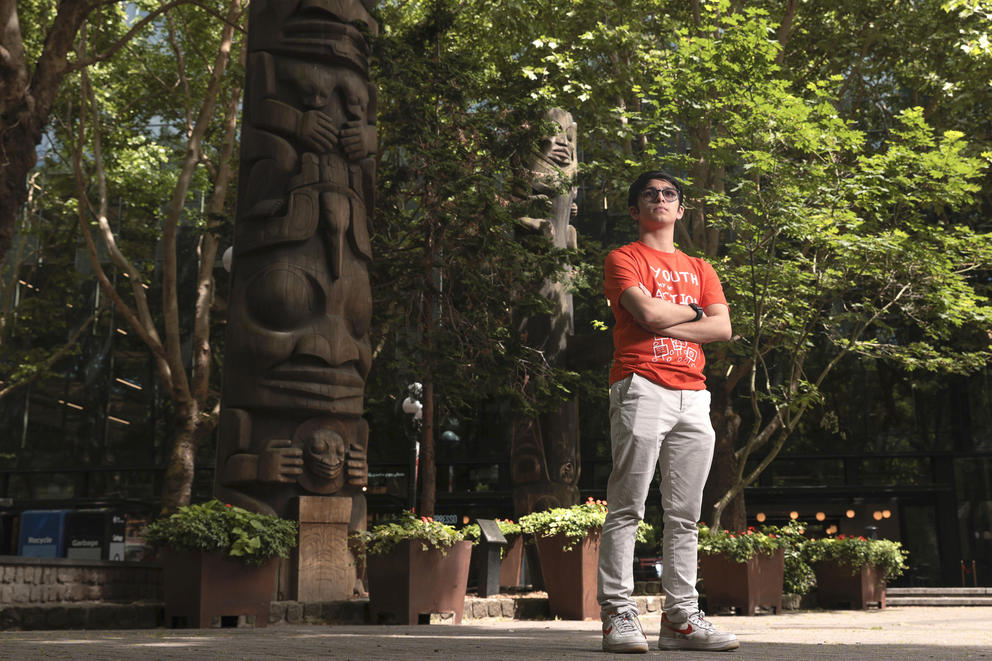Last year, the K-12 school shooting database, an open-source public database that documents when a gun is fired or brandished or a bullet hits school property in the United States, recorded the highest number of incidents in 53 years of data collection. As of 2020, firearm-related deaths are the leading cause of mortality for kids and adolescents aged 1 through 19 in this country.
Among the people fighting to change that are a group of Seattle youth.
The Seattle Student Union is a Seattle nonprofit that advocates for the needs of students across Washington, according to 17-year-old executive director Chetan Soni. Born from an Instagram group chat, the youth-founded and youth-led organization is building safer communities by advocating for gun-violence prevention legislation, helping to secure N95 masks for students, supporting more funding for mental health support in schools and more, all while juggling classes, homework and school sports.
In their most recent victory, the student union helped pass Washington’s assault weapons ban.
“It’s really important life-saving legislation, and students really need this,” Soni said. “Too often people with assault weapons come into schools and start shooting.”
House Bill 1240, signed into law by Gov. Jay Inslee in April, criminalized the importation, manufacturing, distribution, sale and offering of assault weapons in Washington, according to bill documents. Prime sponsor Strom Peterson, who introduced the bill after a shooting in Mukilteo involving an AR-15, says that banning the sale and distribution of these weapons in Washington is a small but significant step in addressing gun violence. The new law doesn’t affect semi-automatic rifles that people already own.
Peterson says that the broad conversations about gun violence that young activists have initiated helped the bill pass. He also credits changes in the makeup of the Washington Legislature for the passage of HB 1240, which had been proposed repeatedly before finally passing this year.
“I think the public, especially young people, have just been a greater force,” Peterson said, “and the polling shows ... that the people of Washington are behind them.”
The Seattle Student Union initially rallied around issues relating to COVID-19 and mental health, but started focusing more on gun violence after the May 2022 shooting in Uvalde, Texas, that left 19 students and two teachers dead. A week after the Texas shooting, the group partnered with the Alliance for Gun Responsibility to hold a press conference at Seattle City Hall, advocating for Governor Inslee to call a special session to ban semi-automatic assault weapons, as well as place mental health counselors with diverse backgrounds in every school.
After a student was shot and killed at Ingraham High School in November 2022, young people in Seattle grappled with their own school safety.
“When a lot of the school shootings happened, I was able to convince myself that it will never happen here ... I thought I was safe,” Goldberg said. “Last November I learned very quickly that I wasn't.”
Goldberg says she remembers hearing from a friend that there was a shooter at Ingraham and leaving her AP Spanish class in tears.
“I freaked out. I had to leave class and I was crying in the bathroom because none of my friends would pick up their phone,” Goldberg said.
The Seattle Student Union organized a citywide student walkout for the next week, advocating for an assault rifle ban. Executive board president Natalya McConnell says they started getting media attention and gained more than 1,000 followers on Instagram in just a few days.
“The unfortunate thing is that someone has to die to get people to walk out of school,” said McConnell, who has been organizing since age 11.
The student union organized a youth lobby day in March when, Soni says, more than 100 students from across the state traveled to Olympia to advocate for gun-violence prevention legislation. The day Inslee signed the assault weapons ban, Soni was in attendance.
“It was really great being there with everyone else in this space knowing that years of work was put into this moment,” Soni said.
Although youth activism played a role in pushing the passage of the assault weapons ban, Soni says this legislation was the product of activism by gun-violence prevention advocates over the past 10 years.
In 2018, following the shooting at Marjory Stoneman Douglas High School in Florida, where 14 students and three staff members were killed, students in Washington organized walkouts.
Brad Blackburn III was one of them. As secretary of his school’s cultural awareness club, Blackburn organized a walkout at his high school in Tumwater, a town that at the time, Blackburn says, had broad support for gun rights. Blackburn initially planned for a protest, but opted for a more peaceful approach after rumors surfaced that some students planned to bring AR-15s to school to counterprotest. Blackburn says he wanted the demonstration to be a moment when the community could acknowledge the loss of life at Parkland, and set up 17 empty chairs for each life lost.
Although students were aware of the issue of gun violence before Parkland, this event was a catalyst for activism among Gen Z, Blackburn said.
“It was really the beginning of this movement among Gen Z of really making our voices heard and standing up for ourselves feeling unsafe in school,” Blackburn said.
Blackburn says this event sparked his interest in the gun-violence prevention movement as a career path. At just 22, Blackburn now works as the operations coordinator and diversity, equity, inclusion and accessibility liaison for the Alliance for Gun Responsibility.
Blackburn says Washington has made tremendous strides in passing legislation to prevent gun violence. During the 2023 legislative session, Inslee signed additional bills that require a 10-day waiting period for firearm purchases and promote responsible business practices by firearm industry members.
On the national scale, Blackburn says progress remains to be made. Many anti-gun violence organizations, such as Everytown for Gun Violence, are pushing for reinstatement of the federal assault weapons ban, which expired in 2004.
According to the Senate Committee on the Judiciary, gun massacres fell 37% while the federal assault weapons ban was in place, but rose 183% after its expiration.
The Alliance for Gun Responsibility notes that in mass shootings involving four or more deaths, assault weapons are responsible for 85% of such fatalities. Data also illustrates that when assault weapons are used in mass shootings, six times as many people are shot.
While communities continue to grapple with the threat of gun violence, the Seattle Student Union, and young activists like them, promise to continue to demand action from those with the power to protect kids and communities.
“If we don’t actively work against these systems, we just get caught up in perpetuating them,” Goldberg said. “It’s so draining to move against the grain, but someone has to do it and the people who should be doing it don’t do anything.”




